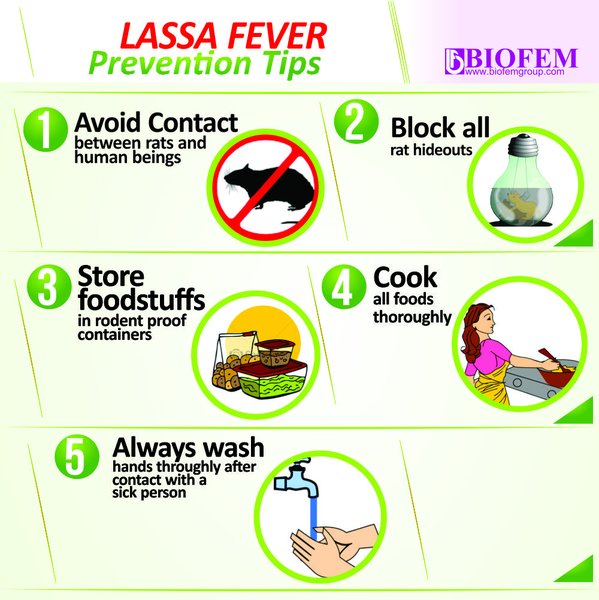Lagos State records 20 suspected cases of Lassa Fever

Lagos State has recorded twenty (20) suspected cases of
Lassa Feveras at January 26, 2016, since the outbreak of the disease in the
Country in November, 2015.
Fourteen (14) suspected cases tested negative, four (4) suspected
cases were confirmed positive of Lasssa Fever, while the results of two (2)
suspected cases are pending. One (1) case was confirmed on the 15th January
2016, two (2) cases were confirmed on 18th January 2016 and one (1)
case was confirmed on 26th January, 2016.
In a statement sent to us by Dr. jide Idris, Commissioner for Health, Lagos State, the Ministry has line-listed 537 contacts of the confirmed
cases and 534 (99%) of the contacts are currently being monitored.
"The last confirmed case was a 27 years old Lady, who travelled
to Edo State on December 24 2015 and returned to Lagos on January 2, 2016. She
became ill on January 14, 2016 and received care in one private hospital and
three churches before she was referred on January 23, 2016 to Ijede General
Hospital with fever, vomiting, diarrhoea and body weakness. The patient died
within a few hours of admission. The case was confirmed as Lassa Fever on
January 26, 2016," Dr. Idris stated.
The remains of the patient has been kept in the morgue in
leak proof body bag. She is to be buried after due consultation with her
family.
Ninety (90) persons have been line-listed as contacts of the
last confirmed case as at January 26, 2016 and contact tracing is
on-going.
Route of Transmission of Lassa Fever
Members of the public are being sensitized to note that
Lassa fever can be contacted through:
Ø Ingestion
of foods and drinks contaminated by the saliva, urine and faeces of infected
rats
Ø Catching
and preparing infected rats as food
Ø Inhaling
tiny particles in the air contaminated with infected rat urine or droppings.
Ø Direct
contact with a sick person’s blood or body fluids, through mucous membranes,
like eyes, nose or mouth.
Those at highest risk of Lassa Fever include:
Ø Families
and friends of an infected person in the course of feeding, holding and caring
for them.
Ø Health
workers who have attended to infected persons.
Residents are urged to watch out for following signs and symptoms of Lassa fever which typically occur within 1-3 weeks after the patient comes into contact with the virus.
Ø Early symptoms
of the disease include fever, headache,
chills, diarrhea, nausea, vomiting, sore throat, backache, and joint pains.
Ø Late
symptoms include bleeding from the
eyes, ears and nose, bleeding from the mouth and rectum, eye swelling, swelling
of the genitals and rashes all over the body that often contain blood. It could progress to coma, shock and death.
How to prevent spread of Lassa Fever
Towards prevention of spread of Lassa Fever, residents are enjoined to:
Ø Observe a high level of personal and environmental hygiene.
Ø Ensure
proper environmental sanitation (Using appropriate methods of collection and
disposal of waste, avoid open defecation).
Ø Wash
hands properly before and after cooking of foods.
Ø Eliminate
rats from dwellings, avoid consumption of rat meat, protect food items from
rodents by storing them in plastic containers with covers and cover all foods
(including left-overs) and water properly.
Health workers are
advised to:
Ø
Be at alert to ensure early detection Lassa fever and other
viral hemorrhagic fever in patients with high fever.
Ø
Report any suspected case to the Primary Health Department
of LGAs or the Ministry of Health.
Ø
Observe
universal safety precautions when attending to all patients.
·
See body fluids of all patients as possible sources of
infection. These include blood, secretions, excretions and other body fluids.
·
Regular hand washing with soap and water.
·
Wear appropriate hand gloves
·
Protect the eyes and noses.
·
Wear gowns, protective
clothing and caps.
·
Sterilise all instruments
·
Decontaminate linen and laundry.
·
Dispose of medical wastes appropriately
Ø
Wear
appropriate PPEs when attending to suspected/confirmed cases.
·
Hand gloves
·
Goggles
·
Face masks
·
Overall (gown).
·
Apron
·
Booths
Ø
Wash their
hands with soap and water regularly.
"All mortuary
personnel are enjoined to follow strict Infection Prevention Control
measures
when handling dead bodies. All mortuary
personnel must wear elbow
length gloves, gowns, overall, goggles, face masks,
booths when attending to corpses," Dr. Idris stated.
Cases to be
suspected are:
Ø Any person with
persistent high fever not responding to standard treatment for malaria and
typhoid fever. Ø Any person with positive history of contact with an infected person or health worker who had treated either suspected or confirmed cases, who suddenly become ill.
The government, towards preventing and controlling the spread of Lassa Fever in the State, has:
Ø Established
an Emergency Operations Centre (EOC) at the Ministry of Health (Conference
Room) to coordinate response.
Ø Rapid
response teams have been set up to carry out the following interventions:
·
Collect blood samples from suspected cases for
investigation.
·
Transfer suspected and confirmed cases to separate
isolation ward for observation and management.
·
Contact identification, listing and
monitoring.
·
Case management.
·
Decontamination
Ø Embarked
on intensive awareness and sensitization campaigns through meetings with
different stakeholders (market women, school teachers, religious leaders etc),
radio jingles, media appearances and distribution of IEC materials.
Ø Supplied Personal Protective Equipment (PPE) to all General
Hospitals, infection prevention commodities (PPEs, Lea Proof Body Bags etc) and
antiviral drugs.
Ø Intensified
Disease Surveillance activities for prompt detection of any new case.
Ø Mobilised
professional from the Lagos State Ministry of Health (LSMH) and its agencies,
Federal Ministry of Health (FMOH), Lagos University Teaching Hospital (LUTH),
Lagos State University Teaching Hospital (LASUTH), Association of Public Health
Physician
Suspected cases should be reported to the nearest public
health facility or notify the Ministry of Health on the following lines
08037170614, 08022234273, 08022241768 08033065303, 08033086660, 08055281442 and
08023169485.
Comments
Post a Comment